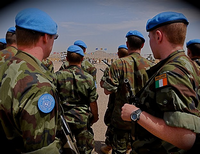A recent issue of the prestigious European magazine Europe's World contains an eye-catching advertisement for NATO: "Question: Which organization adopted a new vision of its geopolitical role in Lisbon? Hint: It wasn't the European Union!" The ad's not so subtle jibe has been borne out by the Libyan crisis, which caught the EU, but not NATO, by surprise. Despite the $43 million the European Commission made available for humanitarian assistance to those in Libya and neighboring countries most affected by the crisis, as well as the EU's prompt imposition of an arms embargo and an asset freeze on the Libyan regime, it was NATO that wound up burnishing its political leadership credentials.
Even the EU's April 1 decision to launch a military operation in support of humanitarian assistance operations in Libya, if so requested by the U.N., leaves the real status of the EU's crisis management policy in question.
In what is regarded as one of the most important European strategic documents, the 2003 European Security Strategy (.pdf), the EU committed itself to what were then perceived to be unambiguous guidelines in this regard. On paper, the EU's ambitions to be seen as an agenda-setter and policy-shaper were unmistakable: "The increasing convergence of European interests and the strengthening of mutual solidarity of the EU makes us a more credible and effective actor. Europe should be ready to share in the responsibility for global security and in building a better world."

